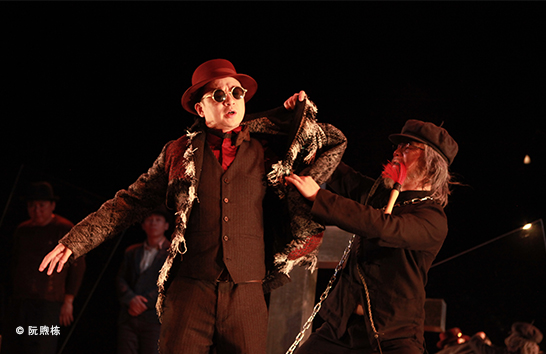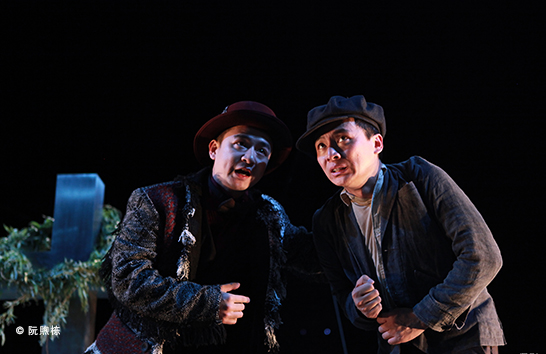China
Xin Chan Performing Art
Directed by Yi Liming
WHEN:
2nd Nov. 2019, 20:00
3rd Nov. 2019, 13:30
WHERE: Studio Theatre of The Grand Theatre
Duration: 180 minutes (with one intermission)
Performed in Chinese, with Chinese and English subtitles

Director Yi Liming, also a famous stage designer, has used sand, skulls, crosses, mirrors, and glass to form a desolate, barren, and absurd scene; It is better to understand it as “expression” than stage art. At the same time, the audience and the actors look at each other through the mirror, breaking the traditional relationship between the players and the audience. We are all viewers of life.
- You Ran
It is worth noting that no matter how hazy the original lines are, they are intersecting, overlapping, and absurd, but every appearance of the word "Godot" brings with it a minimum sense of ceremony, the smallest of “appearances” on stage, even though "he" is never present. If only in this way, the people waiting for Godot, "Gogo" and "Didi," as well as the audience, are able to experience again and again the frustration and emptiness of waiting, which may be the playwright’s primary intention.
- Beijing Youth
This version of "Waiting for Godot" is quite thoughtful in its stage design: replacing the dead trees on the wasteland with steel crosses, forming the spirit of the modern industrial cemetery, and by means of a high-hanging cross-shaped light box, emphasizing the status of lofty beliefs of no substance. Juxtaposed with the intent of the cross is the effect of reflections on a glass mirror. Bringing the audience into the scene, such a contemporary staging is very popular. This kind of central visual image is perhaps close to the director's interpretation of the original work, and also expresses the sigh of the author who lacks a heart of faith.
- The Beijing News

About Waiting for Godot
Waiting for Godot is a play by Samuel Beckett, in which two characters, Vladimir (Didi) and Estragon (Gogo), wait for the arrival of someone named Godot who never arrives, and while waiting they engage in a variety of discussions and encounter three other characters. Waiting for Godot is Beckett's translation of his own original French-language play, En Attendant Godot, and is subtitled (in English only) "a tragicomedy in two acts." The original French text was composed between October 9, 1948 and January 29, 1949. The premiere, directed by Roger Blin, was on January 5, 1953 at the Théâtre de Babylon, Paris. The English-language version premiered in London in 1955. In a poll conducted by the British Royal National Theatre in 1990, it was voted the "most significant English language play of the 20th century."

Credits
Playwright: Samuel Beckett (Ireland)
Translation: Xinchan
Director: Yi Liming
Literary Consultant: Wei Aoyu
English Literature Consultant: Zhao Zhiwen
Sculptor: Wang Guoqiang
Set Design: Zhang Wei
Lighting Design: Liu Chongzhi
Make Up Design: Wang Ting
Sound Design: Liu Bo
Producer: Peng Wenni
Performers:
Huang Kai – Vladimir (Didi)
Zhang Yiman – Estragon (Dogo)
Huang Chengcheng - Pozzo
Xu Qixu - Lucky
Alston Wu - A Boy
Technical Director: An Guiming
Technical Management:Zhang Jianyun
Set Design Assistant: Ruan Xudong
Make Up: Zhao Yanqi
Production Assistant: Qi Yanxin
Graphic Design: Ruan Xudong
Illustration: Alston Wu
Documentary: Su Yuming/Xie Lina
Acknowledgements: Shen Yili, Zheng Ziru, Daniele CRESA, Zhang Yixin,
Fan Xiang, Yi Shuishi

About Yi Liming
Yi Liming is the Artistic Director of Xinchan Performing Art Center. He has directed The Teahouse by Lao She, The Thunderstorm by Cao Yu, Mourning Becomes Electra by Eugene O'Neill and Trilogy of the Spring and the Autumn by dramatist Xu Ying. He was the very first to introduce masterpieces of Western opera to China. He combined Chinese elements and Western operas, and this modern art form was a way for him to talk with the world. In 2014 he started the “Xinchan Sino-English Theater Exchange,” a project that is intended to be a series.

About Xin Chan Performing Art
Xin Chan Performing Art is one of the most active theatre production organizations for contemporary performing arts in Beijing, with YI Liming as its artistic director. With his creative strength at its core, the Theatre Art Center brings together the most distinguished figures in various fields of contemporary Chinese art. Since 2008, it has been continuously launching theatre productions and opera works all over China.





